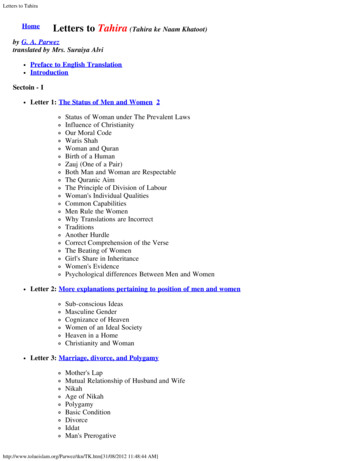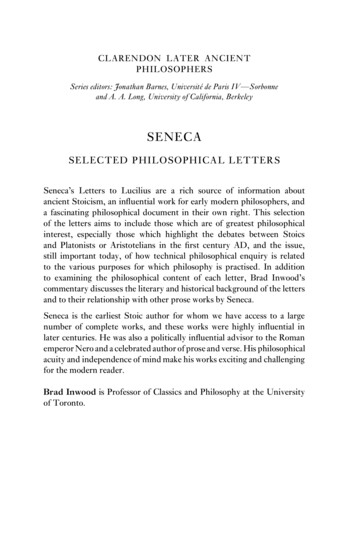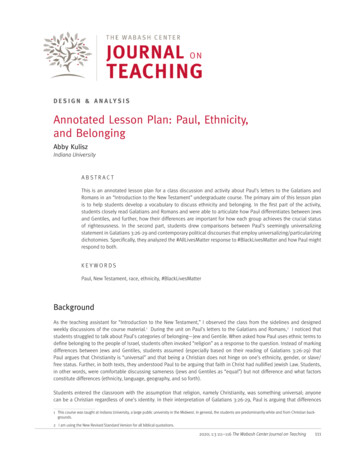
Transcription
Prison Letters of PaulContentment in Times of Trialby Matt Dabbsmattdabbs.wordpress.com
Schedule of LessonsPhilemon: Lesson 1 – Historical Backgrounds of PhilemonLesson 2 – Thankfulness for Other Christians – Phil 1:1-7Lesson 3 – Mending Broken Relationships – Phil 1:8-16Lesson 4 – Expecting the Best – Phil 1:17-25Colossians: Lesson 5 – Introduction and Col 1:1-1:23Lesson 6 - Col 1:24-2:5Lesson 7 – Col 2:6-3:17Lesson 8 – Col 3:18-4:18Ephesians: Lesson 9 – Introduction and Ch1Lesson 10 – Ephesians 2Lesson 11 – Eph 3Lesson 12 – Eph 4:1-5:20Lesson 13 – Eph 5:21-6:21Philippians: Lesson 14 – Introduction and Ch1Lesson 15 – Phil 2Lesson 16 – Phil 3-4
Lesson 1 - Historical Backgrounds of PhilemonInformation useful to understand before a study of the letter’s contentsPaul’s Prison Letters:How did Paul get put in prison? You will have to read the end of Acts (chapters 21-28) to get the whole story. InActs 21 we find Paul heading to Jerusalem and by the end of the chapter he is arrested. Some of the Jews believedhe had brought Gentiles into the temple and caused a great uproar. They tried to kill him (21:31) but he was savedby some Roman soldiers. From there Paul was sent to trial with Felix (Acts 24) where he stayed in jail in Caesareafor two years. This is probably when he wrote Philemon and Colossians. After his appeal to Caesar he wastransferred to Rome where he stood under house arrest for another two years. This is probably when he wroteEphesians and Philippians. In our study we will study them in that order: Philemon, Colossians (Caesareaimprisonment) and Ephesians, Philippians (Roman imprisonment).All four of the prison letters mention Paul’s chains:1. Philemon 10, 13 – in chains for the Gospel2. Colossians – 4:3, 18 – he is in chains for the Gospel3. Ephesians 6:20 – ambassador in chains4. Philippians 1:7, 13, 14, 17 – in chains for the GospelUltimately Paul was executed in Rome after a trial before the supreme court of Rome.Slavery in the Greco-Roman World:One of the most important things to understand about Philemon is the background of slavery in theancient world. Once we have an informed understanding of slavery in the ancient world we will be ableto make better sense out of what Paul is writing to Philemon regarding his slave and Christian brotherOnesimus.What do you typically think of slavery being like?One of the first things we have to overcome is to understand the differences between slavery in Americaand slavery in the ancient world. The two are quite different. Here is how Scott Bartchy explains it,“knowledge of slavery as practiced in the New World in the 17th-19th centuries has hindered more thanhelped achieving an appropriate, historical understanding of social-economic life in the Mediterraneanworld of the 1st century, knowledge of which is absolutely essential for a sound [interpretation]of thoseNT texts dealing with slaves and their owners.”1In the ancient world slaves were viewed as property. People could actually sell themselves into slavery.That doesn’t make sense from a 19th century American slavery point of view. But their system wasdifferent. You could sell yourself into slavery to advance your family through the eventual gaining ofRoman citizenship which had some great benefits in the long run. This is because slaves in the ancientworld could buy their way back out of slavery with a new status. They would even purchase slaves forthemselves while slaves themselves and earn wages. Slaves could come from any conceivablebackground. Some slaves were doctors, philosophers, and government officials. For some, slave life wasvoluntary. If a person wanted Roman citizenship, they could become a slave to a Roman and when they1S. Scott Bartchy, Anchor Bible Dictionary, vol. 6, “Slavery (Greco-Roman)”, ed. David Freedman (New York: Doubleday,1992), 67.
purchased their way out or were released from their obligation (called manumission) gain Romancitizenship. Slavery was not a racial matter. It was a means to get manual labor done.2Are any of these aspects of ancient slavery surprising to you? Which ones?That sheds a lot of light on the letter to Philemon. Once we get out of our minds the 19th centurystereotypes of American slavery and get a proper understanding of slavery in their world things begin tomake more sense. It answers questions like, “Why wouldn’t Paul tell them to free all their slaves?”Because it wasn’t typically a cruel and abusive system, instead it was often used to advance the status ofthe slaves who were able to purchase themselves out of slavery and even then gain status as Romancitizens. It also casts Philemon in a better light. He was not some cruel slave master, rather, he was aloving brother in Christ who undoubtedly treated his slaves with care and compassion.How does the view of slavery above help put to rest how contradictory it seems for Paul to not commandPhilemon to release his slaves as the Christian thing to do? Although Paul may be hinting to Philemon that he ought to release him in vss. 15-17The Reason Paul and Onesimus Connect:Philemon is one of Paul’s prison letters. What is the chance that a slave of one of Paul’s friends wouldend up with him in prison from such a great distance? It had to be intentional. Onesimus is not aprisoner. He is presumably a slave on the run. But notice that Paul assumes he can go back to Philemon.In the Roman world a runaway slave had to be reported if they were found. But it was customary thatslave could run away if they had gotten in trouble and went to seek a friend of their master to makeintercession for them to reconcile the situation. So chances are Onesiums set out to find Paul and Paulwrites the customary letter back to Philemon asking them to be reconciled and to set things right. That isthe letter we have in front of us when we read Philemon. So Onesimus is not running to free himselffrom slavery but seeking out Paul to bring reconciliation with Philemon so he can return in peace.Last, people have assumed Onesimus had stolen money or possessions from Philemon because Paulpromises to pay back any damages (Phil 1:18-19). It is entirely possible that Paul is offering to pay worknot completed in Onesimus’ absence.Have you ever had to appeal to a mutual friend in order to bring about reconciliation in a difficultmanner? What was the result?Learning to Read a New Testament Letter – Format of Ancient LettersPhilemon is a perfect example of what ancient letters were typically like in the Greco-Roman world.Gordon Fee in his book How to Read the Bible for All It’s Worth lays out the form of ancient letters asfollows with examples from Philemon added:Activity – Read the parts of the letter (identified by the numbers below) and let them identify it inPhilemon2Joseph A. Fitzmyer, The Letter to Philemon, The Anchor Bible, vol. 34C (New York, NY: Doubleday, 2000), 25-28.
1. Name of the writers1. “Paul, a prisoner of Jesus Christ and Timothy our brother” (1:1)2. Name of the recipient1. “To Philemon our dear friend and fellow worker, to Apphia our sister, to Archippus ourfellow soldier and to the church that meets in your home:” (1:1)3. Greeting1. “Grace and peace to you from God our Father and the Lord Jesus Christ” (1:2)4. Prayer wish or thanksgiving1. “4I always thank my God as I remember you in my prayers, 5because I hear about yourfaith in the Lord Jesus and your love for all the saints. 6I pray that you may be active insharing your faith, so that you will have a full understanding of every good thing we havein Christ. 7Your love has given me great joy and encouragement, because you, brother,have refreshed the hearts of the saints.” – (1:4-7)5. Body of the letter1. Philemon 1:8-226. Final greeting and farewell1. “23Epaphras, my fellow prisoner in Christ Jesus, sends you greetings. 24And so do Mark,Aristarchus, Demas and Luke, my fellow workers. 25The grace of the Lord Jesus Christ bewith your spirit.Philemon is actually the average length of ancient letters. The letters Paul writes like Romans and Corinthians areextremely long for ancient letters. Hopefully with these three things being understood from the beginning we willbe able to understand Philemon in a way corresponding to Paul’s intended purpose.Activitiy - Read Philemon & Identify as a group the times Paul refers to the following:Love Vs 5, 7, 9How we view and value others Paul’s view of Philemono Thankful – 4o Partnership in the faith – 6, 17o A brother – 7, 20o Respectful of his wishes - 14 Paul’s view of Onesimuso A son – 10o Useful to both Paul and Philemon - 11o A brother – 16o Dear to Paul and Philemon - 16God’s plan and timing Vs 15 – the reason he was gone might be for a greater purpose That purpose will change the roles Philemon and Onesimus see in each otherHow does the letter of Philemon challenge you to see all people as important regardless of status?Is there anyone you need to be reconciled to? How will you go about it?
Lesson 2 - Philemon 1:1-7Thankfulness for Other ChristiansRead the entire letter of Philemon to start the lessonFirst we notice that Paul is in prison. Philemon is one of four letters Paul wrote from prison.Can anyone name the other three of Paul’s prison letters? Ephesians, Philippians, and Colossians.Colossians has some interesting overlaps with Philemon: Both are introduced as coming from both Paul and Timothy. Both introduce Paul as a prisoner (Philemon 1:1, Col 4:3). Both mention Onesimus and Archipus (Philemon 1:1:2, Col 4:9, 17). In the final greetings section of both letters, 5 out of 6 of the people mentioned are in bothPhilemon and Colossians. So we would probably be correct to assume that Philemon lives inColossae.In 1:2 we notice that Philemon is probably the head of a house church in Colossae. The early churchdidn’t meet in large auditoriums. They met in homes and were probably congregations of 50 or lessscattered throughout the city.What advantages have you seen of worship and Bible study in a smaller in-home group versus Sundaymorning in the auditorium?What disadvantages are there?Greeting:In 1:3 Paul writes, “Grace and peace to you from God our Father and the Lord Jesus Christ.” When youread through Philemon were there any things Paul wrote that could bring you grace and peace just as heintended Philemon to experience it?Thanksgiving section:Next we find the thanksgiving and prayer section. It sounds like Paul prays specifically for Philemon, byname, and on regular occasions. Part of expressing our thankfulness for others is praying for themregularly. Do you agree with that last statement? Why/Why not? Who do you find yourself praying for on a regular basis? Are there any commonalities among the people you pray for regularly? (all family, all closefriends?)In verse 6 What benefit does he pray for Philemon to experience?We often pray for people to be healthy and well. We pray for those lost spiritually to be found. Maybethere is a place in our prayer life we need to practice praying for the spiritual growth, maturity and well
being of other Christians as Paul does for Philemon. Notice Paul says Christians are in a partnership witheach other. We are in this together, on the same page, trying to accomplish the same things.In what ways have you seen other Christians as partners in our purpose as Christians?It makes sense that the more we share or tell something to others, the better, richer and deeperunderstanding we will personally have regarding what we share. You might have thought Paul wouldhave told him to “share the Gospel” but instead what does he tell him to share? What is the difference/isthere a difference?It is important as Christians to be thankful for each other and to express that thankfulness in words likePaul did through writing this letter but also through action like the prayers Paul delivered up onPhilemon’s behalf to God.Application:What does Paul say Philemon has done that has given him great joy?How might you go about “refreshing the hearts of the saints” today?How does love work to refresh peoples’ hearts? How might we show love to others and do the same asPhilemon?Activity – Letter writing: Write a letter in group to another Christian at Northwest that has the same tone andthankfulness for them as Paul expresses for Philemon in vs 4-7 Cards and stamps will be provided in advance of this lesson. When finished, have your group members address and stamp the cards Mail these by Wednesday. If you are unable just delegate this to someone in the group who canand give them the completed cards in group.
Lesson 3 - Philemon 1:8-16Mending Broken RelationshipsPhilemon needs the “want to”Paul starts off with a pretty strong appeal. Who is Paul appealing for and why?Paul wants Philemon to make this decision for himself and not something done because Paul twists hisarm.Why do you think Paul wants Philemon to want to make this right rather than doing it out of obligation? Paul wants this experience to grow Philemon’s heart and faith as wellPaul wants Philemon to do this out of love and not out of obligation and yet Paul is certainly doingsome arm twisting in this letter! Paul is making a big appeal here. Something like “I am old youwouldn’t want to spite an old man would you? Onesimus is like a son to me surely you would take backsomeone I consider a son. I have the right to order you but I wouldn’t do that! No instead do it becauseyou are supposed to love others.”How can we become so bitter toward someone else that we no longer have the “Want to”? The want tomake things right.How does an appeal to loving the other person instill back in our hearts the “Want to”?Why mend broken relationships?Why is Paul so interested in making this situation right? Why all the pressure? Paul realizes that healthyChristian relationships are relationships that recognize unity in Christ, common identity and purpose. Tosee these two brothers at odds with each other who are both brothers in Christ seems heart breaking toPaul. When we see it or experience the same in our lives it should get our attention as well.Have you ever experienced a difficult relationship with another Christian? If it was reconciled withoutnaming names, how did it work out?Seeing others as useful even when it doesn’t appear that way:Your Bible probably has a footnote by Onesimus’ name What does it say his name means in Greek?Notice the play on words Paul uses with that in verse 11. It was important for Philemon to start seeingOnesimus as useful again.What things does Paul say to remind Philemon just how useful Onesimus has become? (10-16) He is like a son to Paul - 10 Useful to both Paul and Philemon - 11 He is Paul’s very heart – 12 He is helping Paul in his chains – 13 He is a dear brother and fellow man – 16Paul is honoring Onesimus and raising his status in the eyes of Philemon in an effort to encouragePhilemon to take him back and reconcile this broken relationship.
In verse 16 Paul brings it all into perspective. While Onesimus is a slave the reality is something muchbigger and more important than that What does Paul mention about Onesimus in verse 16 that willbasically force Philemon to do the right thing?This is key in us rekindling the desire to reconcile our own broken relationships. It is easy to view peoplewe don’t like as less valuable. How do we rationalize our attempts to devalue those who treat us poorlyor hurt us?The point Paul made to Philemon is that Paul had a special relationship with him and that Paul had thesame special relationship with Onesimus. All people are lovable and important to God regardless ofwhat our society tells us others are worth. If we are going to mend our own broken relationships severalthings have to happen that Paul teaches us through his letter to Philemon:1. We do all things through the lens of love – vs. 92. Everyone is valuable and special to someone else and that should make them valuable to us aswell.3. We have to view people from a godly perspective. Other Christians, even ones we don’t get alongwith are our brothers and sisters in Christ and we make every effort to make things right in ourrelationships with others.The take home point in these verses for us is about reconciliation toward those who have done uswrong.ApplicationAre there people in your life whom you have never forgiven or “taken back”? If so, why?How do Paul’s words in this letter remind you just how important it is to not hold things against people?How can we, like Paul, still see people who have messed up as “dear to us” again?
Lesson 4 - Philemon 1:17-25Expecting the BestPaul concludes his letter with high expectations for Philemon. But really all he is doing is expecting himto do the right thing. Before we go any further in the letter have a look back at vs16. Do you think Paul isinferring here that Philemon ultimately should let Onesimus go free?A case could be made that if Philemon saw him no longer as a slave but as a brother that he should thenelevate him above the status as a slave.1:17 begins Paul’s last plea for Philemon to do the right thing. Paul expects the best from Philemonbecause he know Philemon is a good, loving man and has been a partner in sharing the gospel withothers. You would hope the leader of a house church and Christian community in the city of Colossaewould listen to the apostle Paul!Have you ever stood up for someone or stepped into a situation to try to make things right? Whathappened and what did you learn from it?What potential barrier or roadblock does Paul attempt to alleviate in the reconciliation of Philemon and Onesimusin vs 19? Paul removes the financial hurdle that Philemon is left with. Philemon has lost time and the work Onesimus would have accomplished in the time he has been gone.What obstacles to reconciliation can we face today?What excuses can we make to leave relationships broken rather than try to fix them?Fixing relationships often means making a sacrifice. We may “lose” something in the process. But Paul’s point is, arenewed and whole relationship is worth far more than the price paid to achieve it.It sounds like Paul converted both Philemon (1:19) and Onesimus (1:10). That gives Paul a very special relationshipwith both of them and makes him the perfect person to help make this situation right again. Do you think youhave played a pivotal role in certain relationships in your life? How can God use you to bring a godly influence onthe people and relationships around you?If all that wasn’t enough Paul concludes with more words about what Philemon ought to do and his confidencePhilemon will do the right thing. It sounds like Paul really knows Philemon. He knows him well enough to knowjust how far to push the envelope with him to make things right. What is interesting is usually we think of theperson who messes up as the one who needs to make it right. But here Paul is stressing the one who has beenwronged, Philemon, as the one who needs to take steps to make this right.Why is it difficult to take the first step toward mending a broken relationship when you were the one wronged?So Paul first overcomes the financial barrier. Then he overcomes the “he hit me first” mentality for Philemon. Lasthe is going to put them both on equal footing.Socially Philemon had superior social status to Onesimus. However, Paul reminds them both that they arebrothers in the matter far more than master and slave. It is important for us all to remember that while byearthly standards people in certain positions are treated in certain ways that is not true in Christ. We treat
everyone the same and don’t elevate some and devalue others. All are equal valuable in Christ’s eyes and so theyare to us as well.1:22 - One last little shot by Paul oh yeah, I intend to visit you soon too. In other words, if you don’t work this outI will know about it when I get there!1:23 – Why does grace play a key role in all that is going on in this book? How do you need to have more grace forthose around you?Sometimes we only act as big or as small as the expectations people have for us. Here, Paul hopes big things ofPhilemon. Maybe it is time we raised our own expectations of our lives in Christ with the understanding that evenat our best it will never be good enough to earn the love God already has for each and every one of us.ApplicationWhat are the biggest roadblocks in your life to making things right with others?Which of these lessons from Philemon would help you overcome that?Who did you relate with the most in this letter: Paul, Philemon, or Onesimus? Why?Activity – Prayer timeConclude in prayer for reconciliations of our relationships in Christ and for those outside the church as well.Pray that God would use us as agents to mend broken relationships and patch up disunity in the body of Christ.
Lesson 5 – Colossians Introduction & 1:1-23BackgroundColossians is one of two letters written by Paul from prison around 60 AD in Caesarea before he wasshipped to Rome. The other letter being Philemon. Col 4:9 seems to say these two letters may havebeen sent at the same time from Paul in prison back to the churches in Colossae. In this letter Paulwrites to people who are first generation Christians. The Christians in Colossae were pagans who wereconverted by the Gospel through Paul’s preaching in Ephesus.Learning to Read a New Testament Letter - OccassionWhy is it important that we understand the circumstances of Paul writing any of his letters? If we are going to understand what Paul is talking about in the letter we need to understand whyhe wrote it This also helps us hear the letter more like the original recipients heard it. When we understandwhat difficulties they were facing we understand how the letter would have been helpful tothem. Paul doesn’t usually write, “This is why I am writing this letter”. You have to read the letter to seewhat Paul addresses in order to see why Paul wrote it. When you read Colossians, especially Col 2, it seems Colossians was written to combat doctrinalerror that is starting to creep into the house churches of Colossae.What error was Paul writing to address? The Jews believed angels were involved in giving the law (Gal 3:19 for instance). It seems falseteachers had come in and said that it was necessary to please these angels, principalities andpowers if God was to hear their prayers (see 2:16-23). In order to please them they were taughtto follow strict dietary (2:21)and holiness guidelines as well as the observance of special days(2:16). Paul is teaching them that such teachings are false and that Christ is still supreme with fullauthority over everything in creation that they don’t need to lean on such hollow and deceptiveteachings (1:15ff, 2:8).Colossians 1:1-23The Work of Jesus Christ in YouBefore addressing their specific concerns and needs Paul lets them know how much he cares for them.What are four kind things Paul says about them in 1:1-1:8?1. Heard of their faith (v.4)2. Heard of their love for God’s people (v.4)3. They have hope (b)4. The Gospel is bearing fruit in them (v.6)Notice Paul’s desire and prayers for them in 1:9-13. What does Paul pray for them in these verses? God to fill them with knowledge of his will, To live a life worthy of the Lord, To please the Lord inevery way, To bear fruit in every good work, To grow in the knowledge of God, To bestrengthened with all power, To have great endurance and patience, To give joyful thanks to God
We often get blinded by praying for people’s physical needs and leave out praying for people to growand mature spiritually and in their faith and knowledge of God.Have you ever prayed for any of these things for another Christian? What prompted you to do that?Keeping in mind that fact that these Christians are combating some false teaching, notice just howrelevant Paul’s prayer for them is. For example: They need knowledge of God and His will to be guided by truth rather than lies They need strength, patience and endurance in order to fight the good fight and withstand falseteachingWhat makes a prayer relevant?How can we be lulled into prayer routine prayers that can lack relevance?In 1:12-14 Paul talks about what God the Father has done on behalf of the Colossian Christians and allChristians – even us. What does Paul say God the Father has done for us in 1:12-14? Qualified us to share in his inheritance (v.12) Rescued us from darkness (v.13) Brought us into the kingdom of the Son (v.13) Redeemed us and forgave our sins (v.14)Before Paul can talk about the untruth of false doctrine, it is important that he spends some timereminding them of the heart and soul of the real Gospel. In the remaining verses of chapter 1.The Work of Jesus Christ in You (1:15-23):In each of the things Paul reminds them about Christ he is showing the supremacy of Christ overeverything. The reason he does this is to show them that the false teaching of pleasing angels pales incomparison to the greatness and authority of Christ.1. Of which angel can you say they are the very image of God or that they are firstborn of allcreation?2. The angels didn’t take any part in the work of creation. Christ created all things. Therefore he hasauthority over all things.3. Notice again in 1:18 – Jesus Christ has supremacy over everything.Why is it important that Jesus have supremacy over all things, even death (1:18)? It shows he has the power to save us from our sins. If someone or something had more authority than Christ then Jesus, God and their kingdomcould be overthrown. But that is impossible. Because Christ has authority over death we believe his promise to raise us from the dead.1:20 – What does the word reconciliation mean? When you reconcile your checkbook or account you balance it out. All debts must be paid andeverything accounted for. How is sin a debt and how did Jesus pay for that debt for us (1:20)?o See Rom 6:23o When we sin we deserve the death sentence but through the blood of Christ the pricewas paid for our forgiveness (1:20).
So Jesus is not only supreme in his being, who he is. He is also supreme in what he accomplished in histime on earth. He not only taught the truth and healed the sick. He shed his blood to bring forgivenessand reconciliation to the whole world.In the last three verses (1:21-23) of the section we are studying Paul tells us more about how thereconciliation he mentioned in 1:19 really works.First, there is our situation. How Does Paul describe the Colossian Christians before they becameChristians? Have you ever been in that boat? Alienated, enemies and evil people What does Paul say caused their alienation from God?o Their evil behavior and acting as enemies to God Do we really view non-Christians as alienated from God even if they still seem like “nice people”?How do these verses inform us on how we see those who don’t believe in Jesus as Lord?Next, he talks about what Christ has done for us while we were in that situation of being lost. What doeshe say Christ did for us?But he says, this reconciliation takes place not just because Christ did that but only if we continue in ourfaith (1:23)In other words, our reconciliation is done by the work of Christ but is only available through continuingin our faith.Application:When do you find your faith growing the most? Is that always an enjoyable experience?How can appreciation of where God has brought us from (alienation and enemies) to where we are now(reconciled as God’s children) help strengthen our faith moving forward?How does knowing Christ is superior and has more authority than any and every power in all creationgive you courage to live a godly life regardless of the obstacles the world throws at you?
Lesson 6 – Colossians 1:24-2:5Paul’s Mission in ColossaeRead 1:24-2:5Notice back in 1:23, What did Paul call himself?Would you consider yourself a servant of the Gospel?How do we serve the Gospel?In the verses we are studying today we learn more about what Paul believed that meant and how helived that out for the benefit of the Colossian Christians.First, servants are known to suffer at times:Servants suffer because servants do what they are told to do. They don’t call the shots. They listen andobey. That sounds harsh but we have to remember all that Paul just taught us about Christ in the firstchapter. What did we learn about Christ last week that makes him easy to follow and serve? He has all power and authority (1:15-18) He contains the fullness of God (1:19) He brought reconciliation and life to lifeless sinners, that’s us (1:20-22) We are now free from accusation (1:22)Jesus Christ has two qualities that we don’t often see side-by-side in our world. He has all power and heis merciful. Why is it difficult for mankind to see those two qualities together?Who does Paul believe he is suffering for? (1:24)We hear people talk about suffering for Christ but rarely do we hear people talk about suffering for the church.Paul is physically in chains because he was trying to advance the Gospel and reach the lost. How do you thinkpeople suffer for the church today?Notice that Paul’s suffering brings him great joy (1:24). Compare this to James 1:2-4. Paul gives us another spin offof suffering producing joy. Here, Paul’s suffering not only makes him more mature in his faith but he is sufferingto make them more mature in their faith (1:28).What things are you willing to suffer for?When have you suffered for something? Did it help you mature in some way?Second, Paul understands that servants have responsibilities:What did Paul say God commissioned him to do?How seriously did Paul take his commission from God (see 1:29-2:1)? God had him share the Gospel with the Gentiles. Paul did so even to the point of his own suffering andimprisonment. What makes some Christians “strenuously contend” to do what God asks and others don’t seem to want tobe bothered with responsibility?Before we think it all depends on us who is Paul leaning o
Learning to Read a New Testament Letter – Format of Ancient Letters Philemon is a perfect example of what ancient letters were typically like in the Greco-Roman world. Gordon Fee in his book How to Read the Bible for All It’s Worth lays out the form of anci










